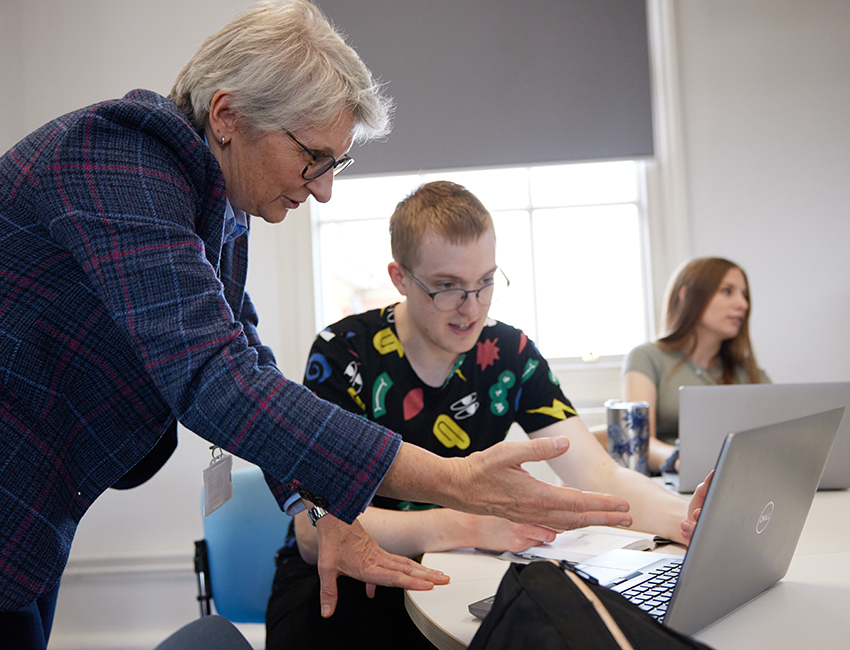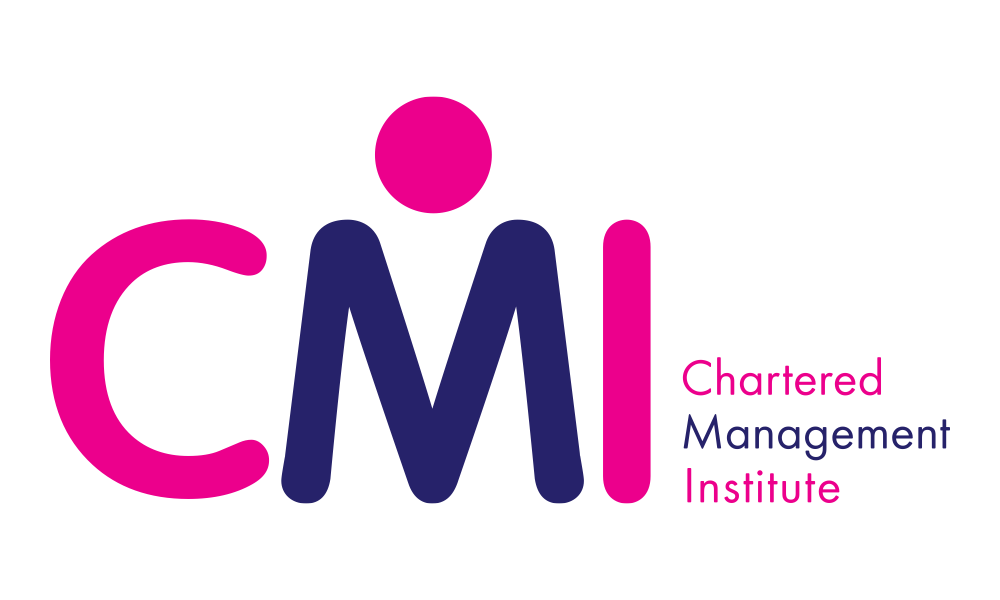You'll gain subject expertise in human resource (HR) management, alongside a grounding in contemporary business issues, such as: change management, talent development, globalisation, workforce diversity, the gig economy and ethical leadership.
Students feel positive about they support they've received on this course
Students feel our lectures are good at explaining things
Accreditation
This course has been mapped for dual accreditation with the Chartered Management Institute (CMI). You will be awarded a CMI Level 5 Certificate in Management and Leadership, in addition to your degree, upon the successful completion of the entire degree.
During your studies, you will also benefit from associate membership to the CMI (at no extra cost), inclusive of an interactive induction session hosted by the CMI, as well as access to the CMI's digital library, resources, and employability skills audit.
University of the Year finalist
Recognised for our graduate success, we’re shortlisted for University of the Year in the Times Higher Education Awards 2025.
Overview
By studying human resources, you'll develop the knowledge, skills and capabilities needed to make an immediate impact in the business sector. You'll also be able to become an associate member of the Chartered Institute of Personnel and Development (CIPD) and Chartered Management Institute (CMI).
In your first year, you’ll gain knowledge and skills in marketing, digital business, data-driven decision-making, and financial management. You’ll then be able to shape the course around your interests and career goals. There are lots of options to choose from in your second and third years, with specialist modules in areas including responsible business, customer relationship management, intercultural business perspectives, and public relations.
At Worcester Business School, you’ll join a community of students from all over the world, all based together on the same campus. With plenty of opportunities for experience sharing and collaboration, you’ll learn from your course mates, as well as guest speakers and our expert academic team.
In addition to our traditional three-year degree, you can choose a four-year course option with either a built-in placement year or a year studying abroad. Whichever route you choose, live client projects, internships, paid work opportunities, networking and mentoring are all part of our applied approach to teaching.
Placements
On this course, there are different ways to gain valuable work experience. You'll have the opportunity to go on a year-long placement which are usually paid and will allow you to gain first-hand experience within a real business environment to enhance your future employability.
You are supported in finding placements and can apply for a vacancy as you would a job. There are sessions to support you in CV writing, interview skills and job applications as well as access to 1:1 tutorials. While on placement, you will be supported by a dedicated placements team able to respond to any problems you may be having, an individual tutor who visits you twice while you are on placement and you will retain access to all the University facilities including e-resources.
At the end of the placement, you are required to submit a placement portfolio containing your learning contract, a satisfactory employer appraisal, a case study and an end of placement presentation. Recent students have completed placements with Rolls Royce, Worcester Bosch, and Deloitte.
Springboard is a flexible work experience programme open to all current students and recent graduates. Springboard matches talented Business and Computing Students with local short-term roles and work experience opportunities to do alongside your studies. You can get in touch with the Placements Office on placements@worc.ac.uk.
Course content
Each year you will study a mix of mandatory and optional modules. This flexible course lets you explore different subjects and career paths in business and human resource management before choosing to specialise in your final year.
We regularly review our courses to reflect the latest research and developments in the subject area, as well as feedback from students, employers and the wider sector. As a result, modules may change to ensure the course remains current and relevant.
Optional modules will run if enough students choose to study them. It is not guaranteed that all modules will be offered every year.
Optional modules
Careers
You’ll be treated like a future business professional from day one, as you develop the skills and experience to succeed in the dynamic, global business world.
You’ll build a portfolio of relevant experience through a one-year paid placement, internships, consultancy projects and company visits. On top of this, we’ll support you with job hunting, CV writing and interview preparation.
Business and Human Resource Management careers
This degree could be the first step toward your career as a:
- Human resources officer
- Office manager
- Business advisor
- Training and development officer
- Business analyst
- Project manager
- Market researcher
- Public relations officer
Other options
You could choose to progress onto a postgraduate degree to take your learning even further. For example our Master of Business Administration (MBA), Marketing MSc or Human Resources MSc.
You could also train to teach with a one-year Primary or Secondary PGCE at Worcester.
Course highlights
Teaching and assessment
Our course has been designed by academics and industry specialists to prepare you for a career in business. You’ll be taught through a combination of practical activities, seminars, lectures and one-to-one tutoring.
Our highly practical assessment methods include presentations, portfolios and consultancy projects - preparing you for the work you’ll be doing when you graduate.
Teaching and assessment contents
You are taught through a combination of interactive workshops, lectures, seminars, laboratory practical sessions, fieldwork, practical activities, etc. Interactive workshops take a variety of formats and are intended to enable the application of learning through discussion and small group activities. Seminars enable the discussion and development of understanding of topics covered in lectures, and laboratory practical sessions are focused on developing subject specific skills and applied individual and group project work.
In addition, meetings (both individual and group) with personal academic tutors are scheduled throughout the academic year. There is an opportunity to undertake a year-long placement in the third year of the course, supervised by a work-based mentor and a University tutor. Depending upon the course, there may be an opportunity to study abroad at one of the exchange partner universities.
Meet the Team
Get to know a few of our Worcester Business School lecturers.
Entry requirements
UCAS tariff points required: 112
| Qualification | Grade |
|---|---|
| A-level | BBC |
| BTEC National Extended Diploma | DMM |
| T-level | Merit |
We do accept Access to HE Diplomas and other qualifications which may not exactly match the combinations above. Work out your estimated points with the UCAS tariff calculator.
Any questions?
If you have any questions about entry requirements, please call our Admissions Office on 01905 855111 or email admissions@worc.ac.uk.
Fees
Fees contents
UK and EU students
In 2026/27 the standard fee for full-time home and EU undergraduate students on BA/BSc/LLB degrees and FdA/FdSc degrees is £9,790 per year.
Tuition fees are reviewed annually and may increase each year for both new and continuing students.
For more details on course fees, please visit our course fees page.
International students
In 2026/27 the standard tuition fee for full-time international students enrolling on BA/BSc/LLB degrees and FdA/FdSc degrees is £17,200 per year.
Tuition fees are reviewed annually and may increase each year for both new and continuing students.
For more details on course fees, please visit our course fees page.
Graduate Case Studies
How to apply
How to apply contents
Applying through UCAS
UCAS is the central organisation through which applications are processed for full-time undergraduate courses in the UK.
Read our how to apply pages for more information on the application process, or if you’d like to apply for part-time study.
Contact
If you have any questions, please get in touch. We're here to help you every step of the way.

Admissions Office
admissions@worc.ac.uk01905 855111More to explore
Open Days
Visiting us is the best way to get a feel for student life at the University of Worcester.

The City of Worcester
Worcester is a welcoming university city with great transport links and plenty of student parking.

Accommodation
Benefit from our accommodation guarantee. We have rooms on campus to suit every budget including en-suite options.














